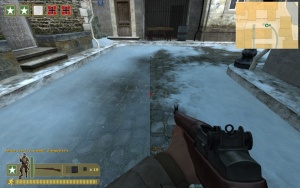WorldVertexTransition: Difference between revisions
Jump to navigation
Jump to search

 Note:This shader now only works on displacements.
Note:This shader now only works on displacements.
TomEdwards (talk | contribs) (→Supported effects: TF2 uses $ssbump) |
TomEdwards (talk | contribs) (not just albedos, practically entire materials) |
||
| Line 1: | Line 1: | ||
[[File:Blendmodulate.jpg|thumb|Application with and without <code>[[$blendmodulatetexture]]</code>.]] | [[File:Blendmodulate.jpg|thumb|Application with and without <code>[[$blendmodulatetexture]]</code>.]] | ||
'''<code>WorldVertexTransition</code>''' is the [[shader]] used to blend the vertices of a [[displacement]] surface between two different | '''<code>WorldVertexTransition</code>''' is the [[shader]] used to blend the vertices of a [[displacement]] surface between two different materials. It handles two at once by using a mirrored set of parameters with "2" in their name. | ||
The pattern of the blend is defined by Hammer's [[Displacement#Blended displacement materials (alpha channel painting)|alpha painting tool]]. The blend is normally a linear gradient, but it can also be "stamped" by a texture specified with <code>[[$blendmodulatetexture]]</code>. This command makes the material look considerably better for very little [[budget|cost]] - use it often! | The pattern of the blend is defined by Hammer's [[Displacement#Blended displacement materials (alpha channel painting)|alpha painting tool]]. The blend is normally a linear gradient, but it can also be "stamped" by a texture specified with <code>[[$blendmodulatetexture]]</code>. This command makes the material look considerably better for very little [[budget|cost]] - use it often! | ||
Revision as of 13:14, 18 August 2009

Application with and without
$blendmodulatetexture.WorldVertexTransition is the shader used to blend the vertices of a displacement surface between two different materials. It handles two at once by using a mirrored set of parameters with "2" in their name.
The pattern of the blend is defined by Hammer's alpha painting tool. The blend is normally a linear gradient, but it can also be "stamped" by a texture specified with $blendmodulatetexture. This command makes the material look considerably better for very little cost - use it often!
Example
WorldVertexTransition
{
$basetexture nature/dirtfloor006a
$surfaceprop dirt
$basetexture2 nature/rockfloor005a
$surfaceprop2 rock
%tooltexture nature/blendrockgrass004a_tooltexture
}
- Just about all visual effects can be selectively applied to one sub-material or the other. See the relevant articles for more details.
- The Hammer material browser won't be able to display a preview of the material unless it's given a
%tooltexture.
Supported effects
$blendmodulatetexture- Todo:
$seamless_scale? $bumpmapand$ssbump$detail(whole material only)$envmap- Todo:
$outline? $translucentand$alpha(whole material only)